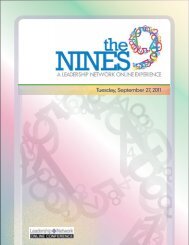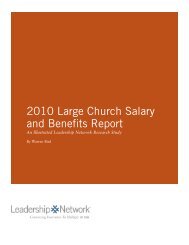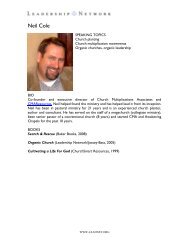ARE WE A PEOPLE AT HALF TIME? - Leadership Network
ARE WE A PEOPLE AT HALF TIME? - Leadership Network
ARE WE A PEOPLE AT HALF TIME? - Leadership Network
Create successful ePaper yourself
Turn your PDF publications into a flip-book with our unique Google optimized e-Paper software.
Multiplying Ministers<br />
Organizations do not grow in any significant<br />
measure without multiplying leaders.<br />
Consequently, it should go without saying that<br />
the New Apostolic Reformation could never<br />
have become the fastest-growing segment of<br />
contemporary Protestantism without an efficient<br />
system of selecting and training leaders.<br />
The leaders are designated as “ministers,” so<br />
an essential key to new apostolic church<br />
growth is multiplying leaders.<br />
Worship<br />
new apostolic leaders are advo-<br />
The congregation is the incubator.<br />
Membership is not a legal contract; rather it is<br />
a spiritual covenant. Few churches reach it,<br />
nevertheless, the ideal is that every single<br />
church member function as a minister. New<br />
apostolic leaders take their roles as apostles,<br />
prophets, evangelists, pastors and teachers, as<br />
found in Ephesians 4:11, very seriously. Their<br />
primary task is detailed in the next verse,<br />
“…for the equipping of the saints for the<br />
work of the ministry.” When this happens, the<br />
congregation becomes the primary incubator<br />
for ministers, both lay ministers and staff ministers.<br />
New apostolic pastors have long since<br />
recognized that to the degree they themselves<br />
attempt to do all or most of the ministry of the<br />
church, they clasp an impenetrable lid on the<br />
growth of their congregation. Therefore, they<br />
make it a point to train others to minister. Lay<br />
people have to be both trained and empowered<br />
for ministry if the church is ever to<br />
become anything other than a small,<br />
static church.<br />
Several cating “coach” as a helpful role designation<br />
for the pastor. What does a coach do The<br />
coach sets the game plan and deploys all<br />
available personnel for executing it and winning<br />
the game. If everyone plays on the team,<br />
what positions do they play Functionally, this<br />
is determined by the spiritual gifts God has<br />
given to each believer. It is up to the pastor or<br />
the coach to help each one discover what gift<br />
or gifts they have, develop them, and then use<br />
them to the fullest extent possible for ministry.<br />
Outreach<br />
Initiation of new apostolic ministry comes<br />
from the bottom up. No church can do everything.<br />
How do we choose The new apostolic<br />
answer is simple—do whatever works. If<br />
their new ministry is meeting a need, it will<br />
work. If not, it will fail. Who initiates ministry<br />
Not some committee or church board or<br />
denominational agency. Anyone can initiate a<br />
new ministry in most new apostolic churches.<br />
The two major structures for organizing lay<br />
ministry in new apostolic churches are ministry<br />
teams and small groups. Some churches<br />
major on one and some on the other. Some<br />
combine the two. Some are transitions from<br />
one to the other. Although some ministry<br />
teams, such as those relating to worship, are<br />
managed by church staff, many of them operate<br />
on the free enterprise model. They are<br />
largely self-directed and self-financed. Some<br />
focus inward, designed to meet the needs of<br />
the congregation, and others focus outward<br />
toward the community.<br />
When lay people are ministering throughout<br />
the congregation, this provides the primary<br />
incubator for new staff leaders. Most new<br />
apostolic churches are characterized by<br />
home-grown staff. This is in contrast to the<br />
traditional model where lay people assuming<br />
staff positions is the exception rather than the<br />
rule. New staff members usually come from<br />
outside the church. The new apostolic paradigm<br />
of home-grown staff carries with it a<br />
series of new realities. The rules of the game<br />
of training for and ordination to professional<br />
ministry are changing. One of the outcomes is<br />
that individuals who are ordained in new<br />
apostolic churches tend to have a considerably<br />
higher age profile than in traditional<br />
churches. The church member who has<br />
demonstrated outstanding spiritual gifts as a<br />
lay person is frequently well into a secular<br />
career. Mid-career changes into full-time<br />
Christian ministry are now becoming<br />
commonplace.<br />
Plugged-In-Worship<br />
New apostolic worship is “plugged in” to<br />
three important power sources: the sound system,<br />
the Holy Spirit, and contemporary culture.<br />
Of all the changes taking place, this one<br />
has also spread outside new apostolic circles<br />
more than any other change. Traditional<br />
churches in just about all denominations are<br />
beginning to realize that worship forms of<br />
past generations will not survive long into<br />
the future.<br />
Outreach in Overdrive<br />
New apostolic churches want to grow and they<br />
are willing to pay the price for growth. Their<br />
outreach is intentionally focused on four central<br />
tasks: (1) expanding the local church,<br />
(2) planting new churches, (3) mercy ministries<br />
in the surrounding communities, and<br />
(4) cross-cultural missions.<br />
Churches that have a vision to reach the lost<br />
are fed up with traditional models. Why<br />
Because they haven’t worked! Among new<br />
apostolic church leaders, whether denominational<br />
or otherwise, there is little aversion to<br />
0<br />
3<br />
pragmatism. They say “If God has given us a<br />
job to do—let’s get it done! If a methodology<br />
works, use it; if it doesn’t work, scrap it!” This<br />
is not a statement of carnality; it is a statement<br />
of driving commitment. God’s work must be<br />
done in God’s way, true. However, throughout<br />
history, God’s ways have changed and changed<br />
again. God’s way of doing something yesterday<br />
is frequently not God’s way of doing it today.<br />
New apostolic church leaders constantly seek<br />
ways to update and contextualize their outreach<br />
ministries. ■<br />
Eight Significant Changes in Worship<br />
From ➜ To<br />
Classical<br />
Performance<br />
Hymns<br />
Pipe organ<br />
Cerebral<br />
Awe of God<br />
Liturgy<br />
Meditation<br />
Contextual<br />
Participation<br />
Songs<br />
Percussion<br />
Celebration<br />
Intimacy with God<br />
Liberty<br />
Mission<br />
Excerpts from Churchquake! The Explosive<br />
Dynamics of the New Apostolic Reformation<br />
by C. Peter Wagner and published by Regal<br />
Books, 1999 (800.446.7735)<br />
Peter Wagner is co-founder of the<br />
World Prayer Center in Colorado and former<br />
professor of missions at Fuller Theological<br />
Seminary. He is recognized worldwide for his<br />
research and writing on church growth and<br />
spiritual warfare.<br />
Con.NEXT.ion<br />
Further reading on New Apostolic<br />
Reformation Churches:<br />
The New Apostolic Churches<br />
by C. Peter Wagner (Regal Books, 1998)<br />
Reinventing American Protestantism<br />
by Donald Miller<br />
(University of California Press, 1997)<br />
A Church for the Unchurched<br />
by George Hunter III (Abingdon, 1996)<br />
The New Reformation: Tomorrow Arrived<br />
Yesterday by Lyle Schaller<br />
(Abingdon, 1995)<br />
NetFax, Issue# 27, “The New Apostolic<br />
Paradigm,” September 4, 1995<br />
NetFax, Issue# 106, “The New Apostolic<br />
Reformation,” September 11, 1998<br />
Both issues of NetFax are accessible at<br />
www.leadnetinfo.org<br />
www.leadnet.org







